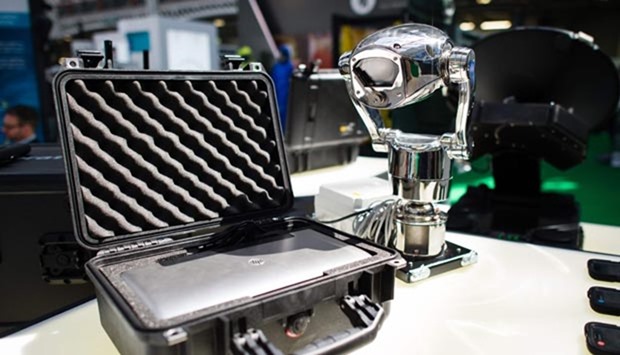The computer screen lights up as a man with a dummy gun in the back of his trousers and a fake suicide vest under his jacket demonstrates a body scanner at a counter-terrorism technology fair in London on Tuesday.
Unlike traditional airport security gates, the scanner can be hidden as large numbers of people walk past and uses technology that was originally developed for the European space programme to monitor the ozone layer.
The invisible barriers were among hundreds of cutting edge gadgets on show at Security and Counter Terror Expo, where transport security provided a key focus following the terror attacks in Brussels last month targeting the city's airport and metro system.
"We've certainly seen more demand for this technology than ever before. Clearly the global security context is accelerating that," said Zak Doffman, chief executive of Digital Barriers, the British company behind the ThruVis scanner being demonstrated.
Drone makers, bomb disposal and border security specialists were among the 240 exhibitors at the fair, where facial recognition technology, data protection and bomb detection equipment featured prominently.
"The global terror threat is high and transport networks are a favoured target," organisers said in a statement that referred to the increasing sophistication of recent terror attacks.
'More complex threat'
Europol chief Rob Wainwright also spoke at the conference, referring to recent attacks in Paris and Brussels as "the most serious international terror threat that we've seen for a generation".
"We're faced with a more complex threat," he said, highlighting the growing use of social media to coordinate attacks and the importance of intelligence sharing at a European level to disrupt terror networks.

A man demonstrates a drone on the Yuneec Electric Aviation stand
David Thompson, the expo's event director, said: "With the safety of millions of people on their minds, security professionals have an increasingly important role to play as the threat evolves".
There were also several producers of hi-tech border fencing at the fair, including the supplier of a new barrier installed at the Eurotunnel terminal to protect against migrants trying to get across.
Calais fence 'doing its job'
"We were approached by Eurotunnel as well as a government agency to attempt to secure the Eurotunnel terminal from the migrants," Peter Jackson, managing director of Jacksons Fencing, told AFP.
"We were on site within a fortnight of being ordered. We installed a high security fence quicker than any other security fence that's been installed in Europe to date," he said, explaining that the company put up 13 kilometres of fence around the hub.
"It's doing its job," he said, adding that the company also has representatives in Russia and the Gulf states.
After an incident at Heathrow airport on Sunday in which a British Airways flight coming in to land crashed into an object believed to be a drone, the potential risk of drones also featured at the expo.
One company, Detect Global, was demonstrating its "DroneWatcher" - an app for the detection and tracking of drones using radar technology.
Drone developers Yuneec highlighted the in-built geo-fencing facilities in their drones, meaning that their devices automatically land when they come close to sensitive areas such as airports.
British officials have also taken note following Sunday's incident and drones have been banned from large parts of London and surrounding areas during US President Barack Obama's visit starting on Thursday.
The drone flight ban was announced by transport minister Patrick McLoughlin "as part of the overarching security plan" for Obama's visit.

